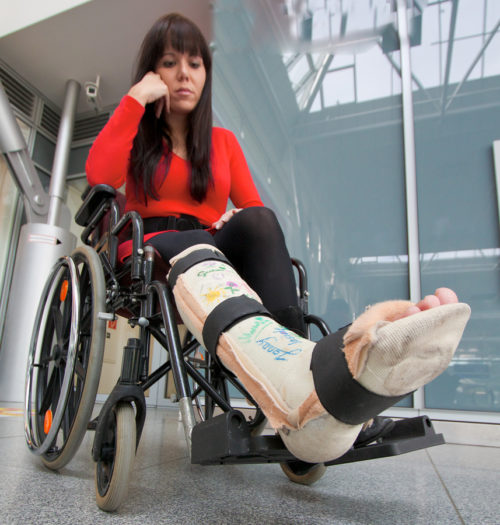Suffering injuries due to the negligence of another individual can cause extreme frustration—not to mention medical bills that add up fast. Different types of accidents can cause many different injuries, but any kind of injury can leave you wondering, “Do I have a personal injury claim?”
You do not have to have a specific type or severity of injury to file a personal injury claim. However, these injuries commonly crop up in personal injury cases.
1. Spinal Cord Injury
In many auto accidents and slip and fall accidents, spinal cord injury results from severe trauma to the back and neck. If the victim suffers a severe injury to the spinal cord, it can lead to paralysis. Typically, paralysis or other deficits in the patient’s ability to move occur from the site of the injury down. A person who suffers an injury to their neck, for example, may suffer paralysis in both arms and legs, while a person whose injury occurs at the waist may only suffer paralysis from the waist down. Spinal cord injury can also cause a host of other symptoms, including a change in sensory perception and function of any organs or systems below the site of the injury. Victims may have no feeling at all below the site of the injury, or they may notice ongoing nerve pain or shocks radiating from the site of the injury.
2. Traumatic Brain Injury
Traumatic brain injury has the potential to impact every aspect of a victim’s life. Mild traumatic brain injury may result in short-term loss of function or difficulties with comprehension. Victims may struggle with memory or have moderate to severe headaches. In more severe cases, a TBI may have a long-term or even permanent impact on the victim’s ability to handle the tasks of normal life. Many victims of traumatic brain injury struggle with emotional regulation. Some experience angry outbursts, while others have ongoing issues with anxiety or depression. In some cases, victims of traumatic brain injury may experience changes in sensory perception or find themselves with vision or hearing deficits as a result of their injuries. Some victims of a brain injury cannot return to work in their former capacity after the accident.
3. Burns
Victims of auto accidents, construction accidents, and product liability accidents, in particular, have a strong likelihood of suffering burn injuries. Minor, first degree burns may cause reddening of the injured skin. In more severe cases, however, blistering may occur. Some severe burns inflict damage below the surface of the skin, damaging muscle, nerve tissue, and even bone. Even minor burns can cause substantial pain and functional for the victim, who may not be able to complete normal activities due to pain. Patients may take a long time to recover from more serious burns. Severe burns, including third degree burns, often cause permanent scarring and disfigurement. Patients may lose normal feeling in the skin above the burn or have increased sensitivity in the area.
4. Amputations
Many times, highly traumatic accidents can lead to amputations. In some cases, the victim suffers amputation during the accident itself. A construction accident, for example, could lead to a limb being severed from the body. In other cases, crushing damage may cause such severe injury to the limb that doctors cannot repair it. Lack of blood flow for a long period of time or severe crushing damage to a limb can cause doctors to decide that amputation represents the patient’s best chances for functionality or survival. Loss of an arm or leg can cause require substantial adjustments to a patient’s ordinary life. Even amputation of fingers and toes can leave patients struggling to complete the normal routines of daily life.
5. Damage to Eyesight or Hearing
Some types of injuries, including electrical accidents and auto accidents, can do more than cause extreme pain and suffering. They may also rob you of one of your senses or severely limit its input, leaving you struggling to engage in normal daily activities. Permanent blindness may leave you feeling adrift in the dark or dealing with blurred vision and struggle to see things in the distance—not to mention a loss of independence, especially if your injuries prevent you from driving. Loss of hearing, on the other hand, may leave you feeling adrift and separated from other people around you. Not only will you miss familiar verbal cues, you may struggle to participate in conversations or miss out on discussions with loved ones.
6. Organ Damage
When you suffer a severe, traumatic accident, your entire body may take the blow. In some cases, this may result in organ trauma. Some people who suffer organ trauma have reduced function in the impacted organ, including the liver, lungs, or heart. Other people who suffer severe organ trauma may find themselves immediately placed on an organ transplant list, their activities severely limited until they can receive a healthy donor organ. Some organ trauma can repair itself over time: the liver, for example, can regenerate from even a small portion of itself. In other cases, organ trauma may cause permanent limitations on the victim’s life.
7. Disfigurement
Disfigurement, especially facial disfigurement, can change the way many people feel about themselves, including their willingness to go out in public. Severe cuts and lacerations and burns can both cause severe scarring, which may transform the victim’s physical appearance. In some cases, plastic surgery can restore normal appearance; in other cases, doctors may find it impossible to restore the victim’s former appearance. Disfigurement can have long-term, lasting implications for many victims’ self-esteem. Some victims of disfigurement cannot find employment in certain fields or may lose their job due to their injuries. In some cases, disfigurement can also cause a loss of function in impacted areas of the body.
Did you suffer serious injury as a result of someone else’s negligence? Contact a personal injury lawyer if you still have questions—you may have grounds for a personal injury claim.

